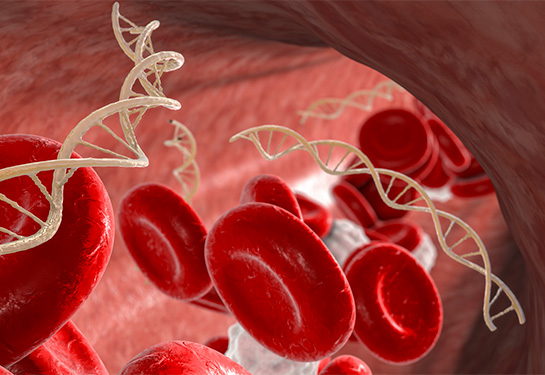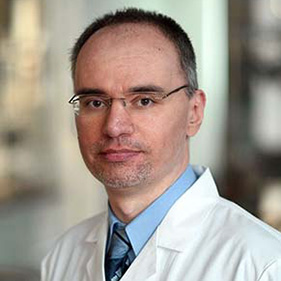Cancer blood tests jumpstart diagnoses and targeted therapy
New research led by a UC Davis Comprehensive Cancer Center clinical scientist shows blood tests used to hunt for cancer DNA may help detect cancers faster and guide the use of targeted therapies. The results of the study were published in NPJ Precision Oncology, an international, peer-reviewed journal focused on targeted cancer care based on a person’s genetics.
UC Davis Professor of Medicine and the cancer center’s Chief Translational Officer Nicholas Mitsiades and his research team from several U.S. cancer centers made a potentially life-saving discovery. While monitoring a patient for prostate cancer DNA after treatment, the researchers identified genetic material coming, not from prostate cancer, but from a type of cancer that starts in or near the urinary bladder. Their analysis showed that DNA from the cancer could be detected in the blood at least 18 months prior to clinical diagnosis using conventional screening such as computed tomography (CT).
When Mitsiades’ team discovered the asymptomatic urothelial cancer, they were able to use data from the blood sample to develop a targeted treatment plan based on the newly detected cancer’s specific gene mutations.
DNA sequencing in blood provides a fast, less invasive method for cancer detection
DNA from some cancers may circulate in a patient’s blood and can be extracted from a simple blood sample. Scientists can genetically sequence the DNA—determining the order of the building blocks of genetic instructions—and characterize the cancer based on what’s found in the blood sample.
“We want to collect information about a patient’s cancer in the least invasive way possible,” Mitsiades said. “The more we can learn about a patient’s cancer, the more we can treat it with safer and hopefully more effective drugs by targeting mutations that show up in the DNA sequencing.”
Sequencing of tumor DNA circulating in the blood is a remarkable technological advancement. While a tissue biopsy is needed for a tumor’s initial diagnosis, it is painful and inconvenient to repeatedly collect samples of tumor tissue. By sequencing tumor DNA from blood samples, a patient’s tumor can be monitored with little discomfort. It can also reveal mutations that suggest a particular treatment path. “Driver mutations” that spur the growth of cancer can be found in blood samples and indicate an aggressive cancer long before it can be detected on other types of tests.
The patient in the study had already been treated for prostate cancer and was participating in a longitudinal study to track potential cancer recurrence. The research team took blood samples at regular intervals and analyzed them for cancer DNA fragments to keep an eye out for signs that his prostate cancer had returned.
It appears that by sequencing DNA circulating in the blood, we can see evidence of cancer growth months or years before it shows up in CT scans.”—Nicholas Mitsiades, Chief Translational Officer, UC Davis Comprehensive Cancer Center
Using circulating tumor DNA analysis to enhance patient treatment
“It appears that by sequencing DNA circulating in the blood, we can see evidence of cancer growth months or years before it shows up in CT scans,” Mitsiades said. “What we need now are clinical trials that will examine whether, by acting upon DNA information from a patient’s blood, we can help them live longer.”
For years, the gold standard of care for cancer treatment was to treat patients once tumors showed visible signs of growth on scans.
Now, with the development of precision oncology tools, like circulating tumor DNA sequencing, Mitsiades and his colleagues think there are opportunities to respond to cancer earlier, identify cancers that have acquired mutations driving resistance to current therapy, and quickly pivot towards alternative, targeted therapies that may be less toxic than chemotherapy.
“These new technologies are opening exciting opportunities to intervene earlier for the benefit of our patients,” Mitsiades said.
He said that DNA sequencing is becoming more widely covered by insurers and incorporated into the standard of care. At UC Davis Comprehensive Cancer Center, genetic tests are already offered regularly to patients who also have the option to participate in precision oncology research at the cancer center.
“In October, Gov. Gavin Newsom signed into law legislation that requires Medi-Cal and private insurers to cover medically necessary biomarker testing,” Mitsiades said. “This will allow more people to access individualized cancer treatments based on the genetic makeup of their cancer.”
Acknowledgments
Coauthors from Baylor College of Medicine and Ben Taub General Hospital include Quillan Huang, Heidi Dowst, Neda Zarrin-Khameh, Attiya Batool Noor, Patricia Castro, Michael E. Scheurer, Guilherme Godoy and Marta P. Mims. The coauthor Irene Mitsiades is of Harvard Medical School and Boston University.
UC Davis Comprehensive Cancer Center
UC Davis Comprehensive Cancer Center is the only National Cancer Institute-designated center serving the Central Valley and inland Northern California, a region of more than 6 million people. Its specialists provide compassionate, comprehensive care for more than 100,000 adults and children every year and access to more than 200 active clinical trials at any given time. Its innovative research program engages more than 240 scientists at UC Davis who work collaboratively to advance discovery of new tools to diagnose and treat cancer. Patients have access to leading-edge care, including immunotherapy and other targeted treatments. Its Office of Community Outreach and Engagement addresses disparities in cancer outcomes across diverse populations, and the cancer center provides comprehensive education and workforce development programs for the next generation of clinicians and scientists. For more information, visit cancer.ucdavis.edu.





